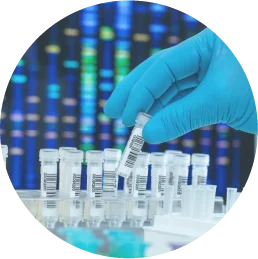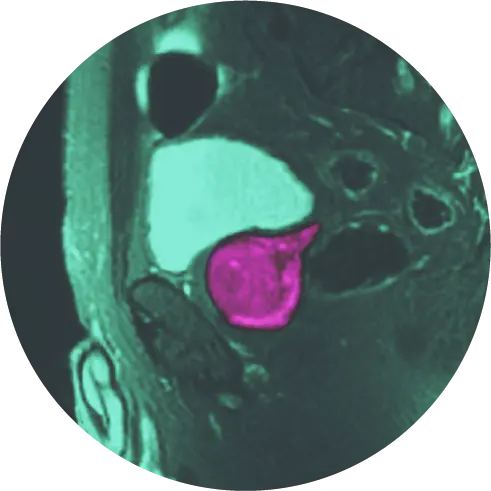Throughout life, we are constantly taking on new experiences and facing new challenges. As we get older, those challenges include dealing with our changing bodies and understanding our health in a new way. What we may not have thought about just ten years ago becomes a high priority, and we must get smarter about taking precautions against preventable and treatable diseases. For men, one example of this is screening for and combatting prostate cancer.
Prostate cancer is a common occurrence as men grow older. After skin cancer, it is the most diagnosed cancer among American men, with one in eight being diagnosed in their lifetimes.1 Though these statistics often elicit fear, people are becoming more empowered when it comes to managing their health, and prostate cancer is no exception. With early detection, it can be successfully treated. That is why understanding what this type of cancer is, its risk factors, how to identify symptoms, and how it is managed are your best defenses.
What Is the Prostate?
Though the term is commonly used, many do not know what the prostate is or what it does. The prostate’s primary function is to produce the fluid that nourishes and transports sperm. Located below the bladder just in front of the rectum, it is part of the male reproductive system that includes the penis, seminal vesicles, and testicles.
At its normal size, the prostate is about the size and shape of a golf ball. However, as men age, it tends to increase in size. As it grows larger, it can cause the urethra to narrow and decrease urine flow. This is called Benign Prostatic Hyperplasia, or BPH. This condition is not the same as prostate cancer, which begins when cells in the prostate gland start to grow out of control.
What Are the Signs and Symptoms of Prostate Cancer?
Men experience prostate cancer in different ways, and there are often no early or beginning warning signs of the disease.2 In some cases, men may experience indications of prostate cancer and it is important to see your doctor if you have any of the following urinary symptoms:
- You have difficulty starting urination.
- Your urine flow is weak or interrupted when you use the bathroom.
- You get up to urinate often, especially at night.
- You have difficulty emptying your bladder completely.
- You feel pain or burning when you urinate.
- You notice blood in your urine or semen.
- You experience pain when you ejaculate.
The prostate cancer symptoms above can be associated with a local prostate issue. If cancer has spread outside of the prostate gland (when the disease becomes known as advanced prostate cancer) symptoms and signs may include:3
- Pain in your back, hips, thighs, shoulders, or other bones
- Swelling or fluid buildup in your legs or feet
- Unexplained weight loss
- Fatigue
- Changes in your bowel habits
It is very easy to panic when you experience pain or your body behaves in a way you aren’t used to feeling. The symptoms listed above can be caused by several different conditions, such as a bladder infection, enlarged prostate, or other non-cancerous disorders. The best course of action if you have one or more of these symptoms is to see your doctor, who can pinpoint the cause or advise if a cancer screening is necessary.
Is Prostate Cancer Painful?
Prostate cancer does not announce itself with pain, making it easier for it to spread silently. This makes early detection key. It is strongly recommended that men begin regular screenings at age 55 to ensure treatment options are explored right away.4
How Is Prostate Cancer Diagnosed?
Prostate Specific Antigen (PSA) Test
Whether you are visiting your doctor for a routine screening or to address new symptoms, they will most likely perform a lab test for Prostate Specific Antigens, or PSAs. The PSA test is a simple blood test that measures how much prostate-specific antigen is in your blood. Higher levels of PSA in the blood can be an indicator of prostate cancer.
Although the PSA level may also be elevated in other conditions that affect the prostate, generally, a higher PSA level in the blood is an indicator that there is an issue with the prostate.5 However, other factors (e.g., age and race) can impact a man’s PSA level. Conditions that can raise a PSA level include:
- Certain medical procedures
- Certain medications
- An enlarged prostate
- A prostate infection
Given the number of reasons PSA levels can be elevated, if your test reads as abnormal, your doctor’s next recommendation may be a second PSA test. Your doctor can then determine if your test results warrant a biopsy, which is the definitive way to diagnose prostate cancer.
What If Cancer Is Found?
If cancer is diagnosed, your doctor will immediately work with you to develop a treatment plan, which will include actions to relieve your symptoms. Sharing any new or worsening symptoms with your doctor will help them stay ahead of the condition and adjust your care as needed. Be sure to empower your healthcare team to provide you with the best possible care by keeping them informed of any changes you experience.
Prevention and Survival
Prostate cancer can be a serious disease, but it is largely non-fatal, and most men survive it when diagnosed at a localized or regional stage.6 However, it can affect your quality of life, and it is strongly recommended that you stay up to date on screenings.
According to the American Cancer Society, “Prostate cancer is more likely to develop in older men and in non-Hispanic Black men. About six in ten cases are diagnosed in men who are 65 or older, and it is rare in men under 40.”7 However, no matter your age or ethnicity, it is important to speak to your healthcare team about risk prevention and early detection. Every exam is an opportunity to ensure a higher quality of life and better health outcomes.
HALO is Here to Help
At HALO Diagnostics, we realize that every patient is unique and so are their prostate concerns. To learn more about scheduling a PSA test at one of our centers or to learn more about our minimally invasive prostate cancer treatments, please schedule a consultation with one of our experts today.
References:
1 https://www.cancer.org/cancer/prostate-cancer/about/key-statistics.html
2 https://www.pcf.org/about-prostate-cancer/what-is-prostate-cancer/prostate-cancer-symptoms-signs/
3 https://www.cancer.net/cancer-types/prostate-cancer/symptoms-and-signs
5 https://www.cdc.gov/cancer/prostate/basic_info/screening.htm
6 https://www.cancer.org/cancer/prostate-cancer/detection-diagnosis-staging/survival-rates.html
7 https://www.cancer.org/cancer/prostate-cancer/about/key-statistics.html




